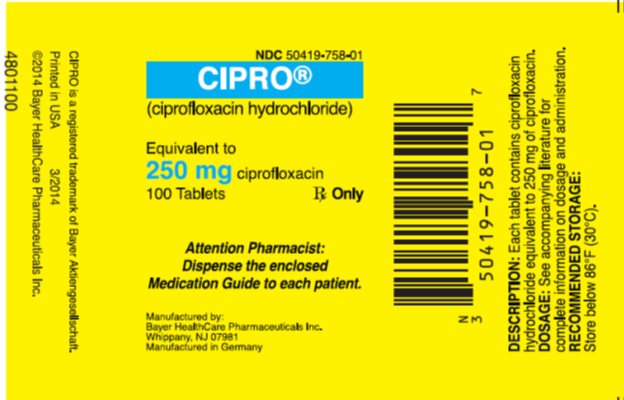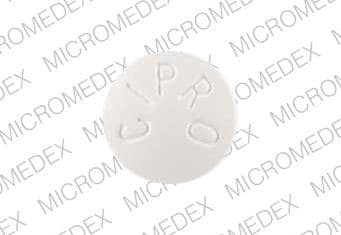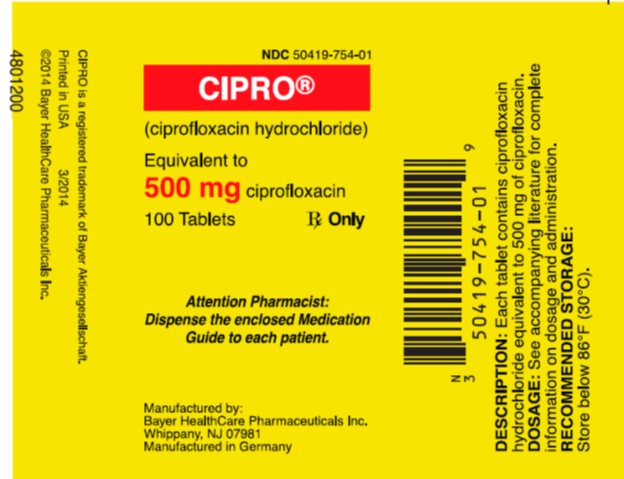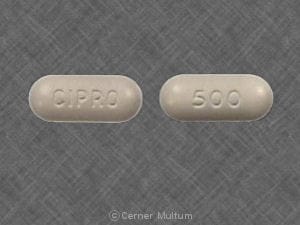Cipro
Generic name: ciprofloxacin (oral)
Drug class: Quinolones
Medically reviewed by A Ras MD.
What is Cipro?
Cipro is a fluoroquinolone antibacterial medicine used in adults age 18 years and older to treat certain infections caused by certain germs called bacteria. These bacterial infections include urinary tract infection, chronic prostate infection, lower respiratory tract infection, sinus infection, skin infection, bone and joint infection, nosocomial pneumonia, intra-abdominal infection, complicated, infectious diarrhea, typhoid (enteric) fever, cervical and urethral gonorrhea, uncomplicated, people with a low white blood cell count and a fever, inhalational anthrax, plague.
Studies of Cipro for use in the treatment of plague and anthrax were done in animals only, because plague and anthrax could not be studied in people.
Cipro should not be used in patients with acute exacerbation of chronic bronchitis, acute uncomplicated cystitis, and sinus infections, if there are other treatment options available.
Cipro should not be used as the first choice of antibacterial medicine to treat lower respiratory tract infections cause by a certain type of bacterial called Streptococcus pneumoniae.
Cipro is also used in children younger than 18 years of age to treat complicated urinary tract and kidney infections or who may have breathed in anthrax germs, have plague or have been exposed to plague germs.
Children younger than 18 years of age have a higher chance of getting bone, joint, or tendon (musculoskeletal) problems such as pain or swelling while taking Cipro. Cipro should not be used as the first choice of antibacterial medicine in children under 18 years of age.
Cipro XR is only used in adults 18 years of age and older to treat urinary tract infections (complicated and uncomplicated), including kidney infections (pyelonephritis).
It is not known if Cipro XR is safe and effective in children under 18 years of age.
Description
CIPRO (ciprofloxacin hydrochloride) Tablets and CIPRO (ciprofloxacin) Oral Suspension are synthetic antimicrobial agents for oral administration. Ciprofloxacin hydrochloride, USP, a fluoroquinolone, is the monohydrochloride monohydrate salt of 1-cyclopropyl-6-fluoro-1, 4-dihydro-4-oxo-7-(1-piperazinyl)-3-quinolinecarboxylic acid. It is a faintly yellowish to light yellow crystalline substance with a molecular weight of 385.8. Its empirical formula is C17H18FN3O3•HCl•H2O and its chemical structure is as follows:

Ciprofloxacin is 1-cyclopropyl-6-fluoro-1,4-dihydro-4-oxo-7-(1-piperazinyl)-3-quinolinecarboxylic acid. Its empirical formula is C17H18FN3O3 and its molecular weight is 331.4. It is a faintly yellowish to light yellow crystalline substance and its chemical structure is as follows:

CIPRO film-coated tablets are available in 250 mg and 500 mg (ciprofloxacin equivalent) strengths. Each CIPRO film-coated tablet contains 250 mg (equivalent to 291 mg ciprofloxacin hydrochloride monohydrate) or 500 mg of ciprofloxacin (equivalent to 582 mg ciprofloxacin hydrochloride monohydrate) CIPRO tablets are white to slightly yellowish. The inactive ingredients are cornstarch, crospovidone, hypromellose, magnesium stearate, microcrystalline cellulose, polyethylene glycol, silicon dioxide, and titanium dioxide.
CIPRO Oral Suspension is available in 5% (5 g ciprofloxacin in 100 mL) and 10% (10 g ciprofloxacin in 100 mL) strengths. CIPRO Oral Suspension is a white to slightly yellowish suspension with strawberry flavor which may contain yellow-orange droplets. It is composed of ciprofloxacin microcapsules and diluent which are mixed prior to dispensing [see Dosage and Administration (2.5)]. The components of the suspension have the following compositions:
- Microcapsules–ciprofloxacin, hypromellose, magnesium stearate, methacrylic acid copolymer, Polysorbate 20 and povidone.
- Diluent–medium-chain triglycerides, sucrose, soy-lecithin, water, and strawberry flavor.
- Five (5) mL of 5% suspension contains approximately 1.4 g of sucrose and 5 mL of 10% suspension contains approximately 1.3 g of sucrose.
What is the most important information I should know about Cipro?
Cipro, a fluoroquinolone antibacterial medicine, can cause serious side effects. Some of these serious side effects can happen at the same time and could result in death.
If you get any of the following serious side effects while you take Cipro, you should stop taking Cipro immediately and get medical help right away.
1. Tendon rupture or swelling of the tendon (tendinitis)
Tendon problems can happen in people of all ages who take Cipro. Tendons are tough cords of tissue that connect muscles to bones.
- Symptoms of tendon problems may include: pain, swelling, tears and swelling of the tendons including the back of the ankle (Achilles), shoulder, hand, or other tendon sites.
- The risk of getting tendon problems while you take Cipro is higher if you:
- are over 60 years of age
- are taking steroids (corticosteroids)
- have had a kidney, heart or lung transplant
- Tendon problems can happen in people who do not have the above risk factors when they take Cipro.
- Other reasons that can increase your risk of tendon problems can include:
- physical activity or exercise
- kidney failure
- tendon problems in the past, such as in people with rheumatoid arthritis (RA)
- Stop taking Cipro immediately and get medical help right away at the first sign of tendon pain, swelling or inflammation. The most common area of pain and swelling is the Achilles tendon at the back of your ankle. This can also happen with other tendons.
- Tendon rupture can happen while you are taking or after you have finished taking Cipro. Tendon ruptures can happen within hours or days of taking Cipro and have happened up to several months after people have finished taking their fluoroquinolone.
- Stop taking Cipro immediately and get medical help right away if you get any of the following signs or symptoms of a tendon rupture:
- hear or feel a snap or pop in a tendon area
- bruising right after an injury in a tendon area
- unable to move the affected area or bear weigh
2. Changes in sensation and possible nerve damage (peripheral neuropathy)
Damage to the nerves in arms, hands, legs, or feet can happen in people who take fluoroquinolones, including Cipro. Stop taking Cipro immediately and talk to your healthcare provider right away if you get any of the following symptoms of peripheral neuropathy in your arms, hands, legs, or feet:
- pain
- burning
- tingling
- numbness
- weakness
Cipro may need to be stopped to prevent permanent nerve damage.
3. Central nervous system (CNS) effects
Seizures have been reported in people who take fluoroquinolone antibacterial medicines, including Cipro. Tell your healthcare provider if you have a history of seizures before you start taking Cipro. CNS side effects may happen as soon as after taking the first dose of Cipro.
Stop taking Cipro immediately and talk to your healthcare provider right away if you get any of these side effects, or other changes in mood or behavior:
- seizures
- hear voices, see things, or sense things that are not there (hallucinations)
- feel restless
- tremors
- feel anxious or nervous
- confusion
- depression
- trouble sleeping
- nightmares
- feel lightheaded or dizzy
- feel more suspicious (paranoia)
- suicidal thoughts or acts
- headaches that will not go away, with or without blurred vision
4. Worsening of myasthenia gravis (a problem that causes muscle weakness)
Fluoroquinolones like Cipro may cause worsening of myasthenia gravis symptoms, including muscle weakness and breathing problems. Tell your healthcare provider if you have a history of myasthenia gravis before you start taking Cipro. Call your healthcare provider right away if you have any worsening muscle weakness or breathing problems.
Who should not take Cipro?
Do not take Cipro if you:
- Have ever had a severe allergic reaction to an antibacterial medicine known as a fluoroquinolone, or are allergic to ciprofloxacin hydrochloride or any of the ingredients in Cipro. See the end of this Medication Guide for a complete list of ingredients in Cipro.
- Also take a medicine called tizanidine (Zanaflex).
Ask your healthcare provider if you are not sure.
What should I tell my healthcare provider before taking Cipro?
Before you take Cipro, tell your healthcare provider if you:
- have tendon problems; Cipro should not be used in patients who have a history of tendon problems
- have a disease that causes muscle weakness (myasthenia gravis); Cipro should not be used in patients who have a known history of myasthenia gravis
- have liver problems
- have central nervous system problems (such as epilepsy)
- have nerve problems; Cipro should not be used in patients who have a history of a nerve problem called peripheral neuropathy
- have or anyone in your family has an irregular heartbeat, especially a condition called “QT prolongation”
- have or have had seizures
- have kidney problems. You may need a lower dose of Cipro if your kidneys do not work well.
- have joint problems including rheumatoid arthritis (RA)
- have trouble swallowing pills
- have any other medical conditions
- are pregnant or plan to become pregnant. It is not known if Cipro will harm your unborn baby.
- are breastfeeding or plan to breastfeed. Cipro passes into breast milk. You and your healthcare provider should decide whether you will take Cipro or breastfeed. You should not do both.
Tell your healthcare provider about all the medicines you take, including prescription and over-the-counter medicines, vitamins, and herbal supplements.
Cipro and other medicines can affect each other causing side effects.
Especially tell your healthcare provider if you take:
- a steroid medicine
- an anti-psychotic medicine
- a tricyclic antidepressant
- a water pill (diuretic)
- theophylline (such as Theo-24, Elixophyllin, Theochron, Uniphyl, Theolair)
- a medicine to control your heart rate or rhythm (antiarrhythmics)
- an oral anti-diabetes medicine
- phenytoin (Fosphenytoin Sodium, Cerebyx, Dilantin-125, Dilantin, Extended Phenytoin Sodium, Prompt Phenytoin Sodium, Phenytek)
- cyclosporine (Gengraf, Neoral, Sandimmune, Sangcya).
- a blood thinner (such as warfarin, Coumadin, Jantoven)
- methotrexate (Trexall)
- ropinirole (Requip)
- clozapine (Clozaril, Fazaclo, ODT)
- a non-steroidal anti-inflammatory drug (NSAID). Many common medicines for pain relief are NSAIDs. Taking an NSAID while you take Cipro or other fluoroquinolones may increase your risk of central nervous system effects and seizures.
- sildenafil (Viagra, Revatio)
- duloxetine
- products that contain caffeine
- probenecid (Probalan, Col-probenecid)
Certain medicines may keep Cipro tablets, Cipro oral suspension from working correctly. Take Cipro tablets and oral suspension either 2 hours before or 6 hours after taking these medicines, vitamins, or supplements:
- an antacid, multivitamin, or other medicine or supplements that has magnesium, calcium, aluminum, iron, or zinc
- sucralfate (Carafate)
- didanosine (Videx, Videx EC)
Ask your healthcare provider for a list of these medicines if you are not sure.
Know the medicines you take. Keep a list of them to show your healthcare provider and pharmacist when you get a new medicine.
How should I take Cipro?
Take Cipro exactly as your healthcare provider tells you to take it.
Your healthcare provider will tell you how much Cipro to take and when to take it.
Take Cipro tablets in the morning and evening at about the same time each day. Swallow the tablet whole. Do not split, crush or chew the tablet. Tell your healthcare provider if you cannot swallow the tablet whole.
Take Cipro oral suspension in the morning and evening at about the same time each day. Shake the Cipro oral suspension bottle well each time before use for about 15 seconds to make sure the suspension is mixed well. Close the bottle completely after use.
Take Cipro XR one time each day at about the same time each day. Swallow the tablet whole. Do not split, crush or chew the tablet. Tell your healthcare provider if you cannot swallow the tablet whole.
Cipro IV is given to you by intravenous (IV) infusion into your vein, slowly, over 60 minutes, as prescribed by your healthcare provider.
Cipro can be taken with or without food.
Cipro should not be taken with dairy products (like milk or yogurt) or calcium-fortified juices alone, but may be taken with a meal that contains these products.
Drink plenty of fluids while taking Cipro.
Do not skip any doses of Cipro or stop taking it, even if you begin to feel better, until you finish your prescribed treatment unless:
- you have tendon problems. See “What is the most important information I should know about Cipro?” above
- you have nerve problems. See “What is the most important information I should know about Cipro?” above
- you have central nervous system problems. See “What is the most important information I should know about Cipro?” above
- you have a serious allergic reaction. See “What are the possible side effects of Cipro?” below
- your healthcare provider tells you to stop taking Cipro
Taking all of your Cipro doses will help make sure that all of the bacteria are killed. Taking all of your Cipro doses will help lower the chance that the bacteria will become resistant to Cipro. If you become resistant to Cipro, Cipro and other antibacterial medicines may not work for you in the future.
If you take too much Cipro, call your healthcare provider or get medical help right away.
What should I avoid while taking Cipro?
Cipro can make you feel dizzy and lightheaded. Do not drive, operate machinery, or do other activities that require mental alertness or coordination until you know how Cipro affects you.
Avoid sunlamps, tanning beds, and try to limit your time in the sun. Cipro can make your skin sensitive to the sun (photosensitivity) and the light from sunlamps and tanning beds. You could get a severe sunburn, blisters or swelling of your skin. If you get any of these symptoms while you take Cipro, call your healthcare provider right away. You should use a sunscreen and wear a hat and clothes that cover your skin if you have to be in sunlight.
What are the possible side effects of Cipro?
See also, “What is the most important information I should know about Cipro?” above.
Cipro may cause serious side effects, including:
- Serious allergic reactions.Serious allergic reactions, including death, can happen in people taking fluoroquinolones, including Cipro, even after only 1 dose. Stop taking Cipro and get emergency medical help right away if you get any of the following symptoms of a severe allergic reaction:
- hives
- trouble breathing or swallowing
- swelling of the lips, tongue, face
- throat tightness, hoarseness
- rapid heartbeat
- faint
- Skin rash. Skin rash may happen in people taking Cipro even after only 1 dose. Stop taking Cipro at the first sign of a skin rash and call your healthcare provider. Skin rash may be a sign of a more serious reaction to Cipro.
- Liver damage (hepatotoxicity). Hepatotoxicity can happen in people who take Cipro. Call your healthcare provider right away if you have unexplained symptoms such as:
Stop taking Cipro and tell your healthcare provider right away if you have yellowing of your skin or white part of your eyes, or if you have dark urine. These can be signs of a serious reaction to Cipro (a liver problem).
- Aortic aneurysm and dissection. Tell your healthcare provider if you have ever been told that you have an aortic aneurysm, a swelling of the large artery that carries blood from the heart to the body. Get emergency medical help right away if you have sudden chest, stomach, or back pain.
- Intestine infection (Pseudomembranous colitis). Pseudomembranous colitis can happen with many antibacterial medicines, including Cipro. Call your healthcare provider right away if you get watery diarrhea, diarrhea that does not go away, or bloody stools. You may have stomach cramps and a fever. Pseudomembranous colitis can happen 2 or more months after you have finished your antibacterial medicine.
- Serious heart rhythm changes (QT prolongation and torsade de pointes). Tell your healthcare provider right away if you have a change in your heart beat (a fast or irregular heartbeat), or if you faint. Cipro may cause a rare heart problem known as prolongation of the QT interval. This condition can cause an abnormal heartbeat and can be very dangerous. The chances of this event are higher in people:
- who are elderly
- with a family history of prolonged QT interval
- with low blood potassium (hypokalemia)
- who take certain medicines to control heart rhythm (antiarrhythmics)
- Joint Problems. Increased chance of problems with joints and tissues around joints in children under 18 years old can happen. Tell your child’s healthcare provider if your child has any joint problems during or after treatment with Cipro.
- Sensitivity to sunlight (photosensitivity). See “What should I avoid while taking Cipro?”
- Changes in blood sugar. People who take Cipro and other fluoroquinolone medicines with oral anti-diabetes medicines or with insulin can get low blood sugar (hypoglycemia) and high blood sugar (hyperglycemia). Follow your healthcare provider’s instructions for how often to check your blood sugar. If you have diabetes and you get low blood sugar while taking Cipro, stop taking Cipro and call your healthcare provider right away. Your antibiotic medicine may need to be changed.
The most common side effects of Cipro include:
- nausea
- diarrhea
- vomiting
- rash
Tell your healthcare provider about any side effect that bothers you, or that does not go away.
These are not all the possible side effects of Cipro. For more information, ask your healthcare provider or pharmacist.
Call your doctor for medical advice about side effects. You may report side effects to FDA at 1-800-FDA-1088.
General information about the safe and effective use of Cipro.
Medicines are sometimes prescribed for purposes other than those listed in a Medication Guide. Do not use Cipro for a condition for which it is not prescribed. Do not give Cipro to other people, even if they have the same symptoms that you have. It may harm them.
This Medication Guide summarizes the most important information about Cipro. If you would like more information about Cipro, talk with your healthcare provider. You can ask your healthcare provider or pharmacist for information about Cipro that is written for healthcare professionals.
For more information call 1-888-842-2937.
How should I store Cipro?
Cipro tablets
- Store at room temperature between 20° to 25°C (68° to 77°F).
Cipro oral suspension
- Store microcapsules and diluent below 25°C (77°F).
- Do not freeze.
- After your Cipro treatment is finished, safely throw away any unused oral suspension.
Cipro XR
- Store Cipro XR between 59°F to 86°F (15°C to 30°C).
Keep Cipro and all medicines out of the reach of children.
Label
PACKAGE/LABEL PRINCIPAL DISPLAY PANEL
- Cipro 250 mg 100 Tablets
- NDC 50419-758-01
- Cipro®
- (ciprofloxacin hydrochloride)
- Equivalent to
- 250 mg ciprofloxacin
- 100 Tablets Rx Only
- Attention Pharmacist:
- Dispense the enclosed Medication Guide
- to each patient.
- Manufactured by:
- Bayer HealthCare Pharmaceuticals Inc.
- Whippany, NJ 07981
- Manufactured in Germany


PACKAGE/LABEL PRINCIPAL DISPLAY PANEL
- Cipro 500 mg 100 Tablets
- NDC 50419-754-01
- Cipro®
- (ciprofloxacin hydrochloride)
- Equivalent to
- 500 mg ciprofloxacin
- 100 Tablets Rx Only
- Attention Pharmacist:
- Dispense the enclosed Medication Guide
- to each patient.
- Manufactured by:
- Bayer HealthCare Pharmaceuticals Inc.
- Whippany, NJ 07981
- Manufactured in Germany


SRC: NLM .
